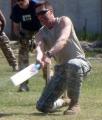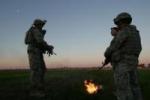1. Afghans have always beaten foreign armies, from Alexander the Great to modern times.
2. The Soviet invasion led to a civil war and western aid for the Afghan resistance
3. The USSR suffered a massive military defeat in Afghanistan at the hands of the mujahideen
4. The CIA's supply of Stinger missiles to the mujahideen forced the Soviets out of Afghanistan
5. After the Soviets withdrew, the west walked away
6. The mujahideen overthrew Kabul's regime and won a major victory over Moscow
7. The Taliban invited Osama bin Laden to use Afghanistan as a safe haven
8. The Taliban were by far the worst government Afghanistan has ever had
9. The Taliban are uniquely harsh oppressors of Afghan women
10. The Taliban have little popular support











Bookmarks